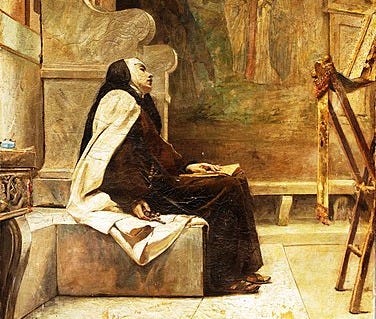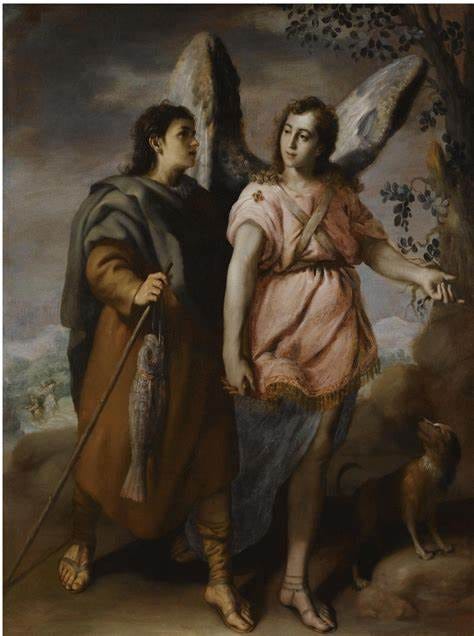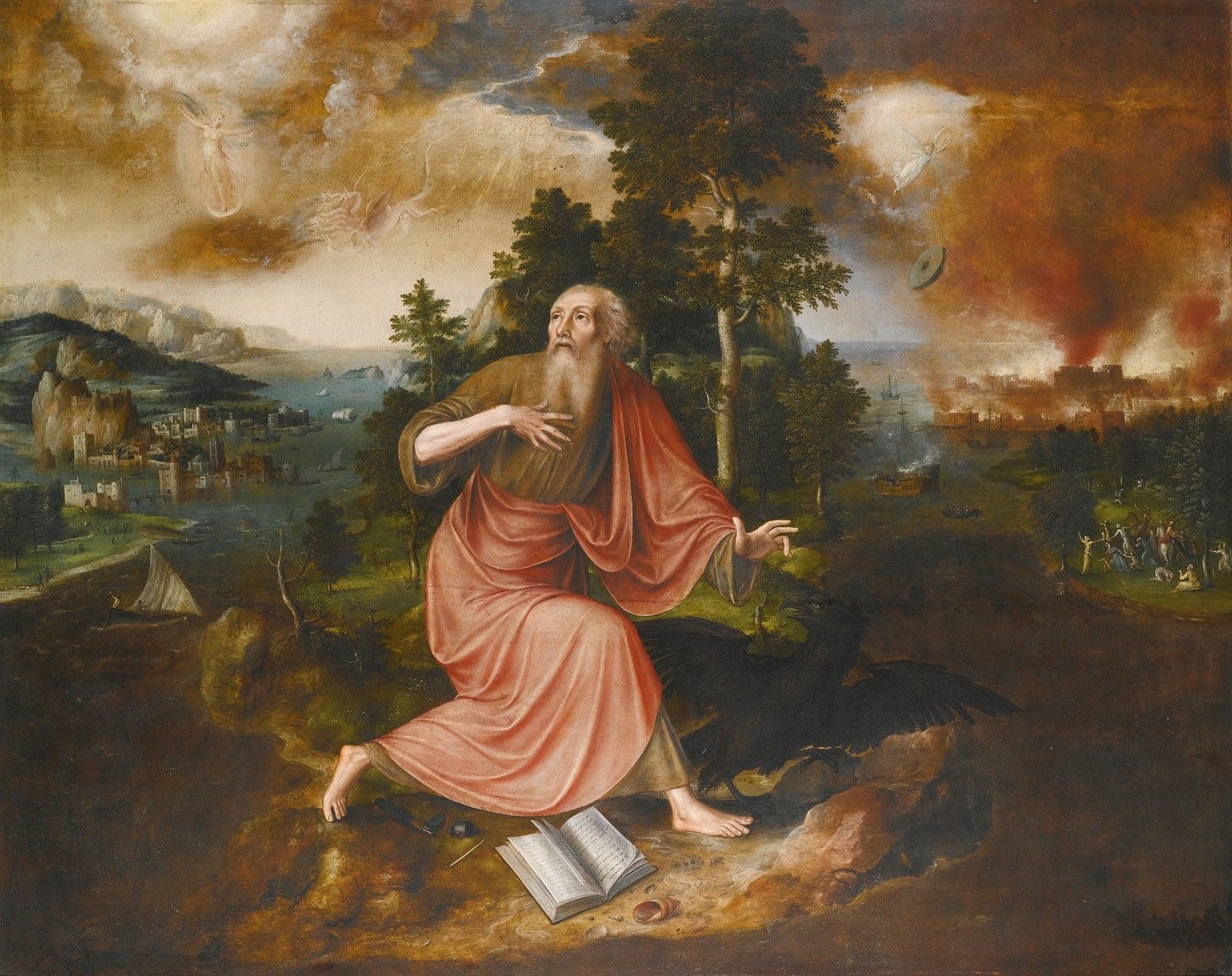St. Teresa and the Mansions, Part IV: The 6th Mansions
God prepares the soul for closer union with Him through intense purification but also through great graces and blessings.
The Sixth Mansions: Passive Purification of the Soul / How to Suffer Interior Trials.
In the Sixth Mansion, God bestows greater favors on the soul, but the soul also suffers more severe afflictions. St. Teresa describes these afflictions, which are both interior and exterior, and she gives directions on how to bear them.
The Sixth Mansion is characterized by these trials, which are really an acceleration and intensification of purification. This corresponds perfectly with St. John of the Cross’ “Dark Night of the Soul,” which is the second and greater purification. This deeper purification gets at the root of our spiritual vices to eradicate them.
In the fourth and fifth mansions, the soul has been enjoying the sight of God, so deeply imprinted on the spirit that its only desire is to behold Him. The soul is now fully determined to take no other Bridegroom than our Lord (much like a betrothal).
However, God disregards the soul’s desires for a speedy espousal, wishing first that these longings should become more vehement and that this good should be purchased at some cost to itself.
Examples of Trials
“O my God, how many troubles both interior and exterior must one suffer before entering the seventh mansions! I fear that, were they known beforehand, human infirmity could scarcely bear the thought, nor resolve to encounter them, however great might appear the gain.” - St. Teresa, Interior Castle.
St. Teresa says, “I think it would be well to tell you of some of the trials certain to occur in this state.” However, you will have to dig into the Sixth Mansions for yourself if you’d like to read about all of them and all their details. I will only speak a little of them here.
Trial #1. Human Praise of Piety and/or Human Commendation of Piety.
A. Others praise you for your piety. “Praise pains such a soul … because it recognizes clearly that any good it possesses is the gift of God and in no wise its own, seeing that but a short time ago it was weak in virtue and involved in grave sins.”
B. Others condemn you for your piety, claiming that you are making a false show of virtue but inwardly you are full of vice and deceived by the devil.
This condemnation is “an outcry raised against such a person by those amongst whom she lives, and even from others she has nothing to do with. They say she wants to pass for a saint, that she goes to extremes in piety to deceive the world.”
“Persons she thought were her friends desert her, making the most bitter remarks of all. They take it much to heart that ‘her soul is ruined’— ‘she is manifestly deluded’ — ‘it is all the devil’s work’ — ‘she will share the fate of so-and-so, who was lost through him,’ and ‘she is leading virtue astray.’ They cry out that she is ‘deceiving her confessors,’ and make a thousand scoffing remarks of the same sort.'
The Soul’s Response to this Trial:
“She does nothing except endeavor to carry out the duties of her state more perfectly.”
Both praise and commendation cause the soul intolerable suffering at first, but later on the soul will come to a place of indifference to either. Men are as ready to speak well as ill of others, so attach no importance to one or the other!
Trial #2: Physical Suffering
“Our Lord now usually sends severe bodily infirmity. This is a far heavier cross, especially if acute pain is felt; if this be violent, I think it is the hardest of earthly trials. I speak of exterior trials, but corporal pains of the worst kind enter the interior of our being also, affecting both spirit and body, so that the soul, in its anguish, knows not what to do with itself, and would far rather meet death at once by some quick martyrdom than suffer thus. However, these paroxysms do not last long, for God never sends us more than we can bear and always gives us patience first.”
“I knew someone who, for forty years, could not affirm with any truth that she had been a single day without pain and other kinds of suffering: I am speaking of physical infirmities besides heavy crosses sent her. True, she had led a wicked life and therefore held these troubles very light in comparison with the hell she had deserved.”
“Our Lord leads those who have offended Him less by some other way, but I should always choose the way of suffering, were it only for the sake of imitating our Lord Jesus Christ.”
Trial #3: Spiritual Dryness and a Confessor Who Doesn’t Understand
“Let us speak of the trial of meeting with so timorous and inexperienced a confessor that nothing seems safe to him; he dreads and suspects everything but the commonplace, especially in a soul wherein he detects any imperfection, for he thinks people on whom God bestows such favors must be angels, which is impossible while we live in our bodies." He at once ascribes everything to the devil or melancholy.”
“The poor soul, beset by the same fears, seeks its confessor as judge, and feels a torture and dismay at his condemnation that can only be realized by those who have experienced it themselves.”
In other words: A pious and devout soul who is genuinely advancing in the spiritual life and undergoing divine consolations and painful purifications, goes to her confessor for help. The confessor, however, being ignorant and inexperienced of such things, dismisses the soul’s struggle as human emotion, imagination, and the work of the devil. Not finding any understanding or compassion in her confessor, the soul suffers even more and is even more confused.
Due to all the various trials that assault it, the soul feels as though God has rejected her, and the pain is intolerable.
The Passive Purification, or Dark Night of the Soul
Why is the soul unable to find consolation from their confessor? Because God our comfort must come from above — nothing earthly can help us. Therefore, He alone can relieve us of our troubles. By this, God wishes us to acknowledge His sovereignty and our own incapacity.
“In short, there is no other remedy in such a tempest except to wait for the mercy of God, Who unexpectedly, by some casual word or unforeseen circumstance, suddenly dispels all these sorrows; then every cloud of trouble disappears, and the mind is left full of light and far happier than before.”
God relieves this soul only when and how He wants to, and there is nothing the soul can do to help herself, nor is any human effort to any avail. These trials are a means to an end: that by them, we will relinquish control and trust God more. He is purifying our faith, hope, and charity.
“The soul is fully conscious that the conquest was not its own; realizes its weakness, and how little man can help himself if God forsake him.”
“This truth needs no demonstration; past experience taught the soul its utter incapacity; it realizes the nothingness of human nature & what miserable creatures we are.”
“Although [the soul is in] a state of grace from which it has not fallen — for, in spite of these torments, it has not offended God, nor would it do so for any earthly thing — yet so hidden is this grace, that the sufferer believes that neither now, nor in the past, has she ever possessed the faintest spark of love for God.”
“How sad it is to see a soul thus forsaken, and how little, as I said, can any earthly comfort avail!”
“What can the poor soul do if such a trial lasts for many days? Prayer makes no difference as far as comforting the heart, which no consolation can enter, nor can the mind even grasp the meaning of the words of vocal prayer: mental prayer is out of the question at such a time, since the faculties are unequal to it.”
“Solitude harms the soul, yet society or conversation is a fresh torment. Strive as the sufferer may to hide it, she is so wearied and out of sorts.”
“How can the soul possibly tell what ails it?”
“Its pains are indescribable; it is wrung with nameless anguish and spiritual suffering. The best remedy for these crosses is to perform external works of charity and to trust in the mercy of God, which never fails those who hope in Him.”
Visions and Locutions
Next, St. Teresa speaks of various kinds of Visions and Locutions: Corporal, Imaginary, and Intellectual. She talks of these things in great depth, making the Sixth Mansion the longest chapter. I will obviously only be touching on this lightly; if you wish to know the full details, please reference the Sixth Mansions of the Interior Castle.
Vision, of course, means ‘seeing,’ while locution is ‘a word or phrase.’ (ie, hearing)
Corporal Visions and Locutions
When one sees a bodily object or hears words uttered by a human tongue.
In the case of a corporal vision or locution, the object seen is a real body, and the words perceived come from a real tongue.
Example: When young Tobias set out on a journey, his companion, Azarias, was not a real human being, but an archangel in human form. Tobias did really see and hear him and felt the grip of his hand; Sarah and her parents, as well as Tobias’s parents, saw and heard him too, but all the time the archangel made himself visible and audible by means of an assumed body, or perhaps of an apparent body. It would be more correct to describe such a phenomenon as an apparition than as a Vision.
Imaginary Visions and Locutions
Nothing is seen or heard; the impression is received upon the imagination.
Imaginary visions and locutions are the most dangerous because our imagination is closely connected to our memory and there is a great danger of deception. It can be difficult to determine whether the source is God, one’s own imagination, or the devil. These kinds of visions/locutions should never be sought after. And these are not the same thing as hallucinations. Hallucinations are due to a physical disorder which affects the memory and causes it to represent impressions formerly received by it, in a disordered manner.
Example: St. Stephen, who saw “the heavens opened, and the Son of Man standing on the right hand of God”; or St. Peter, who saw “the heavens opened, and a certain vessel descending, as it were of a great linen sheet, let down by the four corners from heaven to the earth. According to St. Thomas Aquinas the visions of St. John in the Apocalypse were Imaginary.
Intellectual Vision and Locution:
Nothing is seen or heard by the eyes and ears; no sensation is received by the imagination; the impression is directly imprinted upon the intellect.
These are far less dangerous than corporal or imaginary visions/locutions, because the senses and the imagination have nothing to do with them. The devil influences us via our senses, imagination, memory, etc.; since intellectual visions and locutions bypass the senses, imagination and memory, the devil cannot be their source. Instead, these are directly imprinted onto the intellect, something the devil cannot do.
For Those Inclined: According to St. Thomas Aquinas, the impression received by the eye (Species sensibilis) is spiritualised by a faculty called Intellects agens by means of abstraction (Species impressa), and is stored in the memory, available at demand. The mind, identifying itself with the Species impressa, produces the "Word of the Mind” (Verbutn mentis), where the act of “Understanding” or “Mental Conception” is. In the Intellectual Vision or Locution, God, without use of the senses, imagination, or memory, produces directly on the mind the Species impress. As this is of a supernatural origin, St. Teresa tells us that these Visions and Locutions are often remembered imperfectly and sometimes altogether forgotten.
Example: St. Paul. “I know a man in Christ above fourteen years ago (whether in the body I know not, or out of the body I know not: God knoweth), such as one rapt even to the third heaven. And I know such a man (whether in the body or out of the body, I know not: God knoweth): that he was caught up into paradise, and heard secret words, which it is not granted to man to utter” (2 Cor. 12:2-4).
SUMMARY OF THE SIXTH MANSION
God prepares the soul for closer union with Him via:
Intense purification through interior and exterior trials. These tests of faith are a great mystery that varies person to person in the forms of dryness, aridity, doubt and confusion. They challenge our faith, hope, and charity, thus forcing us to grow in a purer practice of these virtues, as we voluntarily keep choosing to love and obey God despite the darkness.
God bestows greater graces and blessings, “arrows of love.” He awakens and calls the soul. Sometimes this comes in the supernatural form of visions and locutions.
St. Teresa spends a lot of time talking about visions and locutions, their sources, the dangers of delusion, as well as the proofs that they come from God as opposed to our own deceptive imagination or from the devil.











